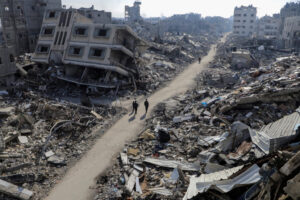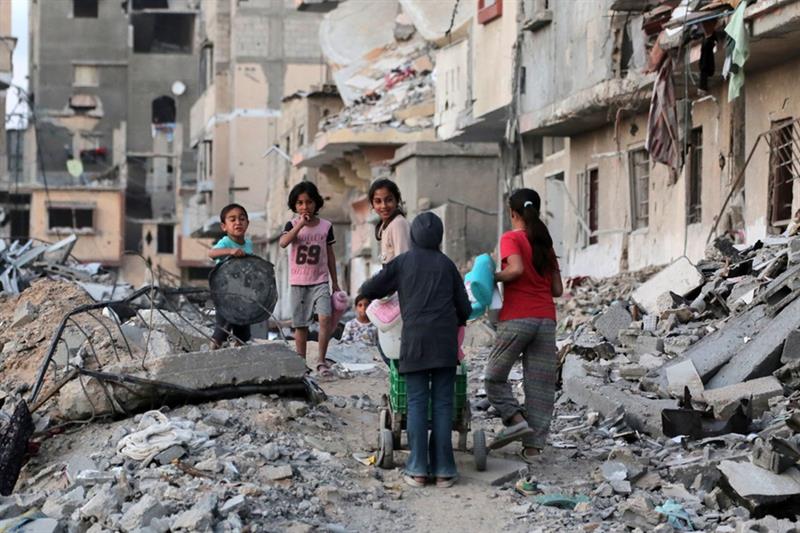Authored by: Humza Rana
Undoubtedly, nations in the Middle East, particularly Gaza, which have endured conflict and involuntary relocation, necessitate organizations with expertise, financial resources, and essential supplies to meet their fundamental needs, community support, and appropriate assessment. Furthermore, creating rehabilitation programs with well-informed professionals is crucial to equip individuals with effective coping strategies and reintegrate into society.
Introduction
The Middle East has faced ongoing conflicts, displacement, and instability, significantly impacting the mental health of its populations. Nations such as Palestine, Syria, Iraq, and Yemen have experienced war, forced migration, and economic hardship, leading to widespread psychological distress. This article explores the effects of conflict and relocation on mental health, the challenges faced by displaced individuals, and potential solutions to mitigate these impacts.
Psychological Consequences of Conflict and Forced Displacement
- Post-Traumatic Stress Disorder (PTSD) and Anxiety
Exposure to violence, destruction, and loss often leads to PTSD, a condition characterized by flashbacks, nightmares, and severe anxiety. Many individuals, including children, develop chronic stress disorders due to the trauma they endure.
- Depression and Emotional Distress
Depression is prevalent among displaced individuals, particularly those who have lost loved ones, homes, or a sense of stability. Feelings of hopelessness, grief, and social isolation exacerbate emotional distress.
- Impact on Children and Adolescents
Children in conflict zones face disrupted education, loss of parental support, and exposure to extreme violence. These factors contribute to long-term psychological issues, affecting cognitive development and social behavior.
Challenges in Addressing Mental Health Issues
- Limited Access to Mental Health Services
Many displaced individuals lack access to mental health professionals, therapy, and medication. The destruction of healthcare infrastructure further worsens the availability of necessary psychological support.
- Cultural Stigma Surrounding Mental Health
In many Arab societies, seeking mental health support is often stigmatized. This prevents individuals from seeking necessary treatment, leaving psychological conditions untreated and worsening over time.
- Economic Hardships and Unemployment
Displacement leads to economic instability, unemployment, and financial insecurity, increasing stress levels. Many refugees struggle with integrating into new societies, further impacting their mental well-being.

Strategies for Mental Health Support and Rehabilitation
To support and rehabilitate mental health in Arab communities, especially in conflict-affected regions, it is crucial to implement strategies that are culturally sensitive and community-focused. First, providing accessible mental health services, such as counseling and therapy, should be prioritized, with an emphasis on trauma-informed care. Training local healthcare providers to recognize and treat mental health issues is essential for creating a sustainable support system. Additionally, community-based programs that involve local leaders and networks can promote resilience and offer peer support for individuals suffering from mental health issues. Public awareness campaigns should be launched to reduce the stigma surrounding mental health, encouraging people to seek help without fear of judgment. Furthermore, integrating mental health support into existing social services, such as education and healthcare, can ensure a holistic approach to rehabilitation. Strengthening social cohesion through cultural, religious, and social institutions will also contribute to the healing process, fostering a sense of community and belonging for those affected. By focusing on these strategies, Arab communities can build a strong foundation for mental health support and rehabilitation, ensuring that individuals have the resources they need to recover and thrive.
- Establishing Community-Based Mental Health Programs
Providing local mental health centers with trained professionals can help displaced individuals access therapy, counseling, and support groups.
- Incorporating Mental Health into Primary Healthcare Services
Integrating mental health treatment within general healthcare settings can ensure that psychological support is widely available, even in crisis settings.
- Promoting Awareness and Reducing Stigma
Educational campaigns can help normalize mental health discussions, encouraging individuals to seek help without fear of judgment.
- Implementing Rehabilitation and Coping Strategies
Programs focusing on vocational training, social reintegration, and resilience-building techniques can help displaced individuals regain stability and confidence in rebuilding their lives.
Future
To mitigate the adverse effects of conflict and forced relocation on psychological well-being in the Middle East, several key strategies should be implemented. Governments and humanitarian organizations must establish accessible and culturally sensitive mental health support programs, including trauma counseling, PTSD treatment, and community support groups. Additionally, structured resettlement policies should be developed to ensure displaced individuals receive adequate housing, employment opportunities, and social integration support. Raising awareness about mental health within conflict-affected communities is also crucial, as it can help reduce stigma and encourage individuals to seek professional support. Strengthening local communities through peer support networks, social cohesion programs, and conflict resolution initiatives can further enhance psychological resilience. Moreover, ongoing research and monitoring of the psychological impact of conflict and displacement can inform evidence-based policies and interventions to address mental health needs effectively. Lastly, international collaboration is essential to provide financial aid, expertise, and resources to countries hosting displaced populations, ensuring comprehensive mental health care. By implementing these strategies, affected individuals can receive the necessary support to rebuild their lives and improve their psychological well-being.
Conclusion
Conflict and displacement continue to take a significant toll on the psychological well-being of individuals in the Middle East. Addressing these challenges requires a multifaceted approach that includes mental health services, community support, and policy-driven solutions. By prioritizing mental health care and creating sustainable rehabilitation programs, affected populations can rebuild their lives and reintegrate into society with resilience and hope.
Sources
